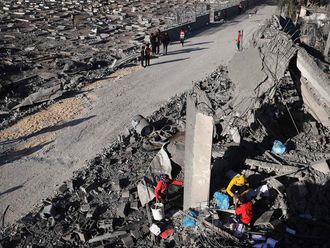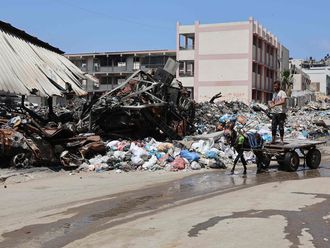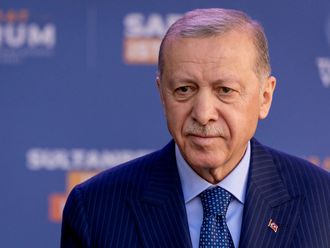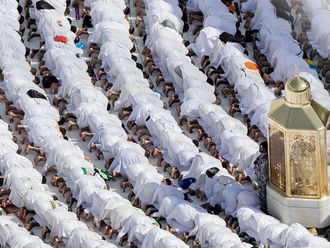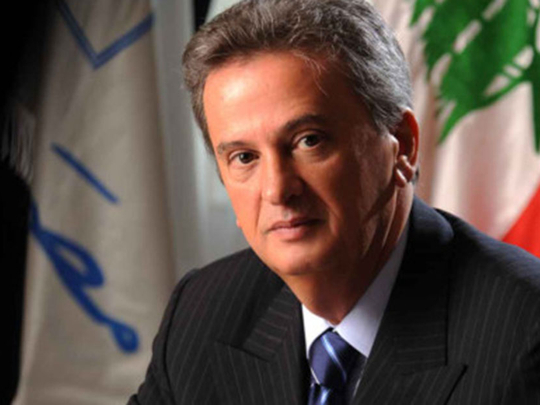
Beirut: A fixture in global financial markets, Lebanese Central Bank Governor Riad Salamé is being touted as a potential presidential candidate, both on merit as well as perfectly honed skills to remain equidistant from all indigenous parties.
His chances to fill the presidential seat left vacant when Michel Sulaiman ended his term on May 24, 2014, improved this past week after the March 8 candidate, Michel Aoun (Free Patriotic Movement), and March 14 nominee, Samir Geagea (Lebanese Forces), signed a “Declaration of Intents” that, for all practical purposes, ended their respective bids for power.
The political draw that spilt over into the body politic at a particularly ugly sectarian period in contemporary Lebanese affairs opened doors for alternative leaders, including the affable Salamé, who was entrusted with his current position on August 1, 1993.
Born on July 17, 1950 to Toufic Salamé and Renée Romanos, Riad attended the College Notre-Dame de Jamhour (Jesuits) before he enrolled at, and earned a Bachelor of Arts in economics from the American University of Beirut in 1973. Between 1973 and 1993, Salamé worked for Merrill Lynch, both at its Beirut and Paris offices, where he eventually became a vice-president and financial adviser.
Recommended by senior International Monetary Fund (IMF) officers, President Elias Hrawi and Prime Minister Rafik Hariri nominated him for his first six-year term as Governor of the Central Bank, in 1993. Interestingly, Presidents Emile Lahoud reappointed Salamé for two consecutive terms in 1999 and 2005, and Sulaiman followed suit in 2011. In fact, because Salamé served different political leaders who seldom agreed, his credibility improved after he focused on purely financial matters, something he learnt in Western institutions. As he worked with Western creditors to strengthen the Lebanese pound, the governor banked on his numerous contacts, developed during his two-decades long association with Merrill Lynch — then a pillar of American capitalism that became the wealth management division of Bank of America in 2008 after the global financial meltdown — that, undeniably, helped Beirut recover.
Salamé’s efforts led the pound to recover much of its lost value in the aftermath of the Lebanese Civil War. In 1975, the parity of the pound vis-a-vis the US dollar was three to one though it reached the astronomical figure of 2,500 to 1 in 1992. Since December 1997 the rate of the pound has been fixed at 1507.5 pounds per US$ and seems to be relatively stable.
Media friendly
In his capacity as Governor, Salamé chaired various financial bodies, including the bank’s Central Council, the Higher Banking Commission, the Special Investigation Commission that is mandated to fight money laundering, and the Capital Markets Authority, all of which allow him to provide a good reading of the country’s financial pulse. A transparent and media-friendly individual, Salamé was a frequent visitor to the President of the Republic during the past few decades, providing advice as necessary.
Beyond Lebanon, Salamé was a member of the Board of Governors at the IMF and the Arab Monetary Fund (AMF) and, in 2012, chaired the IMF and World Bank Boards of Governors meetings in Tokyo.
The recipient of numerous awards, including an Honorary Sash and a Shield Award from the Hariri Canadian University, Lebanon (2011); an Honorary Doctorate in Human Letters from the Lebanese University (2010); Officer of the Legion of Honour bestowed by French President Nicolas Sarkozy (2009); an Arab Creativity Award in Economics, presented by Prince Khalid Al Faisal, Chairman of the Arab Thought Foundation (2009); and a second Honorary Doctorate from the Lebanese American University of Beirut (LAU) also in 2009,
Salamé was widely acknowledged as a champion of conservative monetary policies that safeguarded the local currency. His many contributions, especially his behind-the- scenes efforts to reinvigorate Middle East Airlines — given that the Central Bank owned large chunks of the national airline — earned him widespread accolades. The Banker magazine voted him Central Banker of the Year in 2009 and, in March of that year, Salamé became the first Arab central bank governor honoured at the New York Stock Exchange when he was invited to ring the starting bell.
Whether his proven financial skills are sufficient to become President of Lebanon are impossible to know although the low-key governor seldom misses an opportunity to display his unwavering nationalism. For him, Lebanon is a reality, worth every sacrifice to retain its independence and ensure the prosperity of its citizens.


